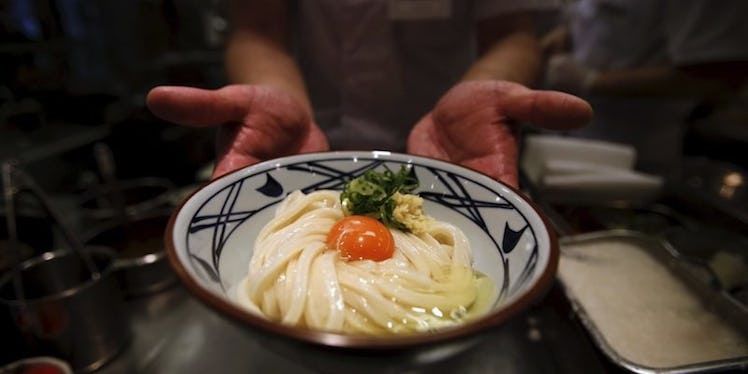
Eating A Lot Of Carbs Is Actually Good For You, According To A Study
Fitness experts may tell you to avoid carbohydrates at all costs, but a new study shows a diet rich in grains leads to a long, healthy life.
Japan boasts the world's second highest life expectancy and an obesity rate of just 3.5 percent -- compared to America's 35 percent.
Researchers at Tokyo's National Center for Global Health and Medicine conducted a study to determine the value of following Japan's recommended dietary guidelines.
This diet features a high amount of grains, fish and soybean-based products but very little fat, according to Huffington Post.
For the study, lifestyle and food questionnaires were given to 80,000 participants, whose health was then tracked for 15 years.
Researchers found those who followed Japan's recommended diet the most closely were 15 percent less likely to die of any cause compared to those who didn't closely follow the diet.
Individuals with a history of cancer, stroke, heart disease or chronic liver disease were not included in the study.
James DiNicolantonio, a cardiovascular research scientist at St. Luke's Mid America Heart Institute, believes the Japanese maintain good health through high-carb diets, thanks to a lack of processed food, minimal intakes of fat and high amounts of physical activity.
Another major factor in Japanese health is the fact they eat lots of fish, which provide omega-3 fatty acids and help create a mix of macronutrients that could offset obesity.
DiNicolantonio told Huffington Post,
Combining a high intake of carbohydrates and fat is the perfect storm for obesity. The Japanese tend to eat high carb (both rice and vegetables) but a low intake of fat.
The average American would probably gain weight from eating so many carbs, however, because he or she only walks about 5,000 steps per day.
In Japan, on the other hand, the average person walks over 7,000 steps per day.
DiNicolantonio added,
I think the best takeaway for Americans, when looking at the Japanese, is that if we restrict our intake of refined sugar, industrial seed oils, and increase [our] intake of marine omega-3s, then we might be able to tolerate eating more rice. We can learn a lot about how to be healthy from the Japanese, and it really comes down to 'eat real food' and 'exercise.'
One might note Japan's version of America's food pyramid puts water at the very top, along with a picture of a man running to emphasize physical activity.
It seems Japan's love of tea could also play a factor in people's health.
Citations: The Healthiest People In The World Eat A Lot Of Carbs (Huffington Post)